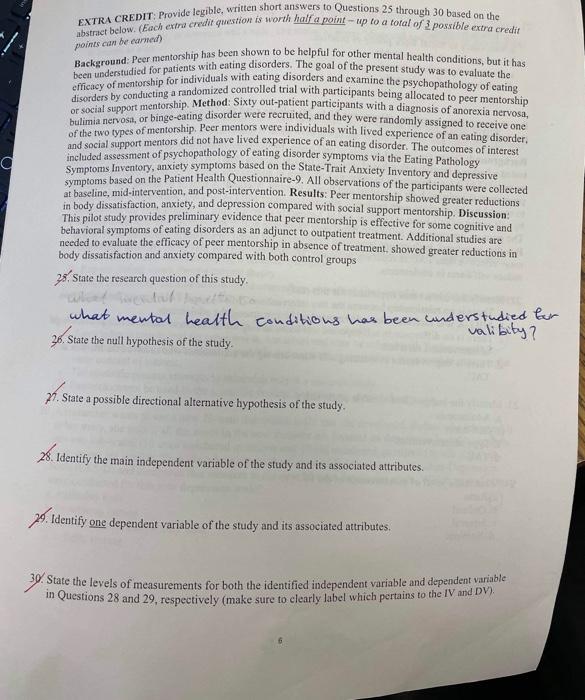Answered step by step
Verified Expert Solution
Question
1 Approved Answer
please answer this as soon as possible EXTRA CREDIT. Provide legible, written short answers to Questions 25 through 30 based on the abstract below. Each
please answer this as soon as possible 
EXTRA CREDIT. Provide legible, written short answers to Questions 25 through 30 based on the abstract below. Each extra credit question is worth hallot-up to a total of 3 possible extra credit points can be card) Background: Peer mentorship has been shown to be helpful for other mental health conditions, but it has been understudied for patients with eating disorders. The goal of the present study was to evaluate the disorders by conducting a randomized controlled trial with participants being allocated to peer mentorship or social support mentorship. Method: Sixty out-patient participants with a diagnosis of anorexia nervosa, efficacy of mentorship for individuals with eating disorders and examine the psychopathology of eating of the two types of mentorship. Peer mentors were individuals with lived experience of an eating disorder, bulimia nervosa, or binge-eating disorder were recruited, and they were randomly assigned to receive one included assessment of psychopathology of eating disorder symptoms via the Eating Pathology Symptoms Inventory, anxiety symptoms based on the State-Trait Anxiety Inventory and depressive symptoms based on the Patient Health Questionnaire-9. All observations of the participants were collected at baseline, mid-intervention, and post-intervention. Results: Peer mentorship showed greater reductions in body dissatisfaction, anxiety, and depression compared with social support mentorship. Discussion: This pilot study provides preliminary evidence that peer mentorship is effective for some cognitive and behavioral symptoms of eating disorders as an adjunct to outpatient treatment. Additional studies are needed to evaluate the efficacy of peer mentorship in absence of treatment showed greater reductions in body dissatisfaction and anxiety compared with both control groups 28. State the research question of this study what mental health conditions has been onderstudied for valibity? 26. State the nult hypothesis of the study. 7. State a possible directional alternative hypothesis of the study 28. Identify the main independent variable of the study and its associated attributes. 29. Identify one dependent variable of the study and its associated attributes. 30. State the levels of measurements for both the identified independent variable and dependent variable in Questions 28 and 29, respectively (make sure to clearly label which pertains to the IV and DV) EXTRA CREDIT. Provide legible, written short answers to Questions 25 through 30 based on the abstract below. Each extra credit question is worth hallot-up to a total of 3 possible extra credit points can be card) Background: Peer mentorship has been shown to be helpful for other mental health conditions, but it has been understudied for patients with eating disorders. The goal of the present study was to evaluate the disorders by conducting a randomized controlled trial with participants being allocated to peer mentorship or social support mentorship. Method: Sixty out-patient participants with a diagnosis of anorexia nervosa, efficacy of mentorship for individuals with eating disorders and examine the psychopathology of eating of the two types of mentorship. Peer mentors were individuals with lived experience of an eating disorder, bulimia nervosa, or binge-eating disorder were recruited, and they were randomly assigned to receive one included assessment of psychopathology of eating disorder symptoms via the Eating Pathology Symptoms Inventory, anxiety symptoms based on the State-Trait Anxiety Inventory and depressive symptoms based on the Patient Health Questionnaire-9. All observations of the participants were collected at baseline, mid-intervention, and post-intervention. Results: Peer mentorship showed greater reductions in body dissatisfaction, anxiety, and depression compared with social support mentorship. Discussion: This pilot study provides preliminary evidence that peer mentorship is effective for some cognitive and behavioral symptoms of eating disorders as an adjunct to outpatient treatment. Additional studies are needed to evaluate the efficacy of peer mentorship in absence of treatment showed greater reductions in body dissatisfaction and anxiety compared with both control groups 28. State the research question of this study what mental health conditions has been onderstudied for valibity? 26. State the nult hypothesis of the study. 7. State a possible directional alternative hypothesis of the study 28. Identify the main independent variable of the study and its associated attributes. 29. Identify one dependent variable of the study and its associated attributes. 30. State the levels of measurements for both the identified independent variable and dependent variable in Questions 28 and 29, respectively (make sure to clearly label which pertains to the IV and DV) 
Step by Step Solution
There are 3 Steps involved in it
Step: 1

Get Instant Access to Expert-Tailored Solutions
See step-by-step solutions with expert insights and AI powered tools for academic success
Step: 2

Step: 3

Ace Your Homework with AI
Get the answers you need in no time with our AI-driven, step-by-step assistance
Get Started


